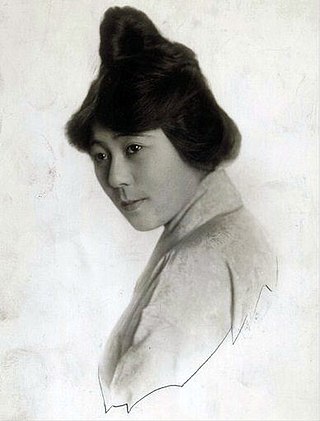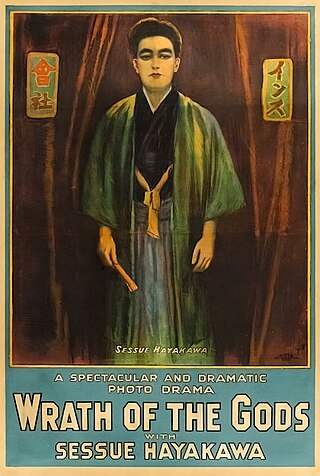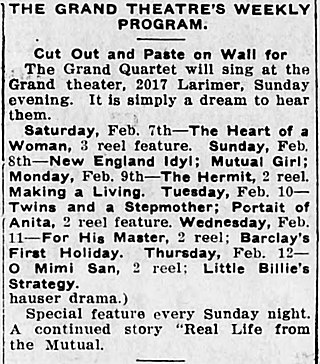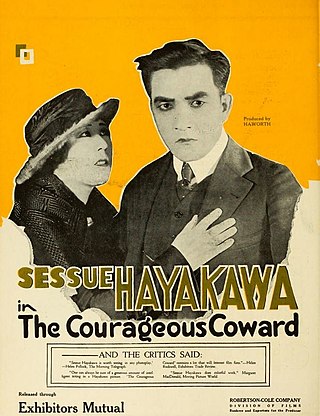
Kintarō Hayakawa, known professionally as Sessue Hayakawa, was a Japanese actor and a matinée idol. He was a popular star in Hollywood during the silent film era of the 1910s and early 1920s. Hayakawa was the first actor of Asian descent to achieve stardom as a leading man in the United States and Europe. His "broodingly handsome" good looks and typecasting as a sexually dominant villain made him a heartthrob among American women during a time of racial discrimination, and he became one of the first male sex symbols of Hollywood.

Tsuru Aoki was a Japanese stage and screen actress whose career was most prolific in the United States during the silent film era of the 1910s through the 1920s. Aoki may have been the first Asian actress to garner top billing in American motion pictures.

The Swamp is a 1921 American silent drama film released by the Robertson-Cole Pictures Corporation and directed by Colin Campbell. The film was written and produced by Sessue Hayakawa, who also co-stars with Bessie Love. A print of this film is preserved at the Gosfilmofond archive in Moscow.

The Wrath of the Gods is a 1914 American silent drama film directed by Reginald Barker and starring Sessue Hayakawa, Tsuru Aoki, Frank Borzage, Thomas Kurihara and Henry Kotani. This was the first feature film appearance of Hayakawa and the directorial debut of Barker.

The Call of the East is a 1917 American silent drama film directed by George Melford and written by Beulah Marie Dix. The film stars Sessue Hayakawa, Tsuru Aoki, Jack Holt, Margaret Loomis, James Cruze, and Ernest Joy. The film was released on October 15, 1917, by Paramount Pictures.

O Mimi San is a 1914 American short silent drama film directed by Charles Miller, featuring Tsuru Aoki in the title role and Sessue Hayakawa.

The Geisha is a 1914 American short silent film, directed by Raymond West and using music by Sidney Jones from the stage musical The Geisha. The film features Sessue Hayakawa, Tsuru Aoki, Frank Borzage, Ramona Radcliffe and Henry Kotani in important roles.

The Courageous Coward is a 1919 American silent drama film directed by William Worthington and featuring Sessue Hayakawa and Tsuru Aoki in lead roles.

Sessue Hayakawa: Silent Cinema and Transnational Stardom is a biography of actor Sessue Hayakawa, written by Daisuke Miyao, assistant professor of film at the University of Oregon, and published by Duke University Press. It won the 2007 Book Award in History from the Association of Asian American Studies and the John Hope Franklin Book Award from Duke University (2007).
The Famine is a 1915 American silent short drama film directed by George Osborne and featuring Sessue Hayakawa and Tsuru Aoki.

A Heart in Pawn is a 1919 American silent drama film directed by William Worthington. Sessue Hayakawa's Haworth Pictures Corporation produced the film and Worthington played the lead role along with Vola Vale and his wife Tsuru Aoki.

Bonds of Honor is a 1919 American silent film directed by William Worthington. Sessue Hayakawa's Haworth Pictures Corporation produced the film and he himself played the leading roles along with his wife Tsuru Aoki. Marin Sais, Dagmar Godowsky, Herschel Mayall, Toyo Fujita and M. Foshida also appeared in the film.

The Great Prince Shan is a 1924 British silent drama film directed by A.E. Coleby and featuring Sessue Hayakawa, Ivy Duke, Tsuru Aoki, Valia, David Hawthorne, Fred Raynham and Henry Vibart in important roles. The film is adapted from the 1922 novel of the same title by E. Phillips Oppenheim. It was made at Cricklewood Studios by Stoll Pictures, the largest British production company of the era. Location shooting took place on the French Riviera. It was one of two films former Hollywood star Hayakawa made for Stoll along with Sen Yan's Devotion released later the same year.
Sen Yan's Devotion is a 1924 British drama film directed and written by A.E. Coleby. Sessue Hayakawa, Tsuru Aoki, Fred Raynham, Jeff Barlow and Tom Coventry featured in the film.
Haworth Pictures Corporation was a film studio established by Japanese actor Sessue Hayakawa in March 1918.

The Man Beneath is a 1919 American silent crime drama film directed by William Worthington and produced by Sessue Hayakawa's Haworth Pictures Corporation. A complete copy of the film is in the collection of the EYE Film Institute Netherlands.

The Tong Man is a 1919 American thriller film directed by William Worthington and produced by Haworth Pictures Corporation.

The Beggar Prince is a lost 1920 film directed by William Worthington and produced by Sessue Hayakawa's Haworth Pictures Corporation.

An Arabian Knight is a 1920 American drama film directed by Charles Swickard and produced by Sessue Hayakawa's Haworth Pictures Corporation. Its survival status is classified as unknown, which suggests that it is a lost film. Nevertheless, the Library of Congress lists this as being in their collection.

The Cheat is a 1937 French drama film directed by Marcel L'Herbier and starring Victor Francen, Sessue Hayakawa and Louis Jouvet. It is a remake of the American silent film The Cheat by Cecil B. DeMille.

















